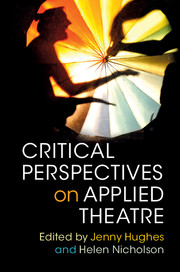Book contents
- Frontmatter
- Contents
- List of figures
- List of contributors
- 1 Applied theatre: ecology of practices
- PART I HISTORIES AND CULTURAL MEMORIES
- PART II PLACE, COMMUNITY AND ENVIRONMENT
- 6 Performing location: place and applied theatre
- 7 Peacebuilding performances in the aftermath of war: lessons from Bougainville
- 8 Applied theatre and climate change in Bangladesh: indigenous theatrics for neoliberal theatricks
- 9 Applied theatre and disaster capitalism: resisting and rebuilding in Christchurch
- PART III POETICS AND PARTICIPATION
- Notes
- Index
- References
7 - Peacebuilding performances in the aftermath of war: lessons from Bougainville
from PART II - PLACE, COMMUNITY AND ENVIRONMENT
Published online by Cambridge University Press: 05 April 2016
- Frontmatter
- Contents
- List of figures
- List of contributors
- 1 Applied theatre: ecology of practices
- PART I HISTORIES AND CULTURAL MEMORIES
- PART II PLACE, COMMUNITY AND ENVIRONMENT
- 6 Performing location: place and applied theatre
- 7 Peacebuilding performances in the aftermath of war: lessons from Bougainville
- 8 Applied theatre and climate change in Bangladesh: indigenous theatrics for neoliberal theatricks
- 9 Applied theatre and disaster capitalism: resisting and rebuilding in Christchurch
- PART III POETICS AND PARTICIPATION
- Notes
- Index
- References
Summary
London, 2006. I'm part of a ‘community performance’ working group, meeting at the Performance Studies international conference (PSi #12) on the theme of ‘Performing Rights’. An opportune moment to reflect on the challenges and potential benefits of applied theatre interventions in places marked by violent conflict. By this time, I had completed some preliminary fieldwork in the Autonomous Region of Bougainville in Papua New Guinea (PNG), the first steps in an ongoing inquiry into how ceremonies of ritual reconciliation are being used to progress the peace process there in the wake of a decade-long civil war. I had received kind support from local non-government organisations (NGOs) and invitations to observe the practice of village-based mediators. The question I wanted to discuss with fellow conference delegates was what, if anything, I might be able to offer by way of cultural exchange with my Bougainvillean contacts. One possibility, for which my training and the bulk of my professional experience in applied theatre was particularly relevant, would have been to run workshops on the methods of Augusto Boal's ‘Theatre of the Oppressed’. Indeed, one of the NGOs with which I had consulted was already using educational materials – in their campaigns to promote literacy, health, environmental awareness, good governance and respect for human rights – that were clearly inspired, as Boal had been, by the strategies of Paulo Freire's ‘Pedagogy of the Oppressed’. Apart from the inevitable logistical difficulties and funding issues, why was I hesitating? ‘Why’, as one conference delegate bluntly put it, ‘would you want to withhold these empowering tools from the people who need them?’
History provides part of the answer. Flashback to Bougainville, 1988–1997.
- Type
- Chapter
- Information
- Critical Perspectives on Applied Theatre , pp. 127 - 149Publisher: Cambridge University PressPrint publication year: 2016
References
- 3
- Cited by



